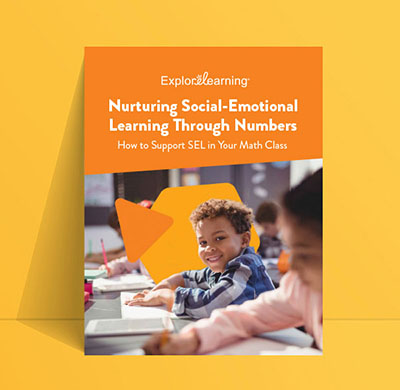Nurturing Social-Emotional Learning Through Numbers: 3 Easy Ways to Support SEL in Your Math Class

A large part of teaching math is helping students become masterful mathematicians. The greater part is helping students grow into happy, healthy adults. Teaching involves developing the whole child, so students not only learn how to solve equations but also learn how to build relationships and manage emotions.
The truth is that many math skills, like problem-solving and decision-making, apply to far more than just addition and subtraction. They are social-emotional skills—crucial life skills needed to approach real-world problems.
Support your students’ growth by incorporating social-emotional learning competencies into your daily math routine. And watch students develop the self-confidence they need to succeed in school, at home, and beyond.
What is social-emotional learning (SEL)?
Social-emotional learning (SEL) is the process of developing intra- and interpersonal social and emotional skills.
There are five SEL competencies.
- Self-awareness involves recognizing emotions and thoughts and how they influence behavior.
- Self-management refers to effectively managing emotions, thoughts, and behaviors in different situations.
- Social awareness is the ability to empathize with others from diverse backgrounds and cultures.
- Relationship skills involve establishing and maintaining healthy and rewarding relationships with diverse individuals and groups.
- Responsible decision-making refers to making constructive and respectful choices in regard to personal behavior and social interactions.
People with strong social-emotional skills are better equipped to navigate daily challenges, collaborate with others, and make informed decisions.
How to integrate social-emotional learning into your math class
- Build a community through collaboration
Encourage students to create positive relationships through collaborative math projects. Have different students take on different roles with each project, so students can understand how each person plays an important part in the team. Group projects and activities also allow students to talk through their thinking and participate in discussions when they agree or disagree with each other. Board games and center activities are great ways to foster teamwork. - Solve real-world problems
Problem-solving is a key skill in math success, but it is also a social-emotional skill students use in everyday life. Have students solve real-world math problems, like managing a schedule or purchasing groceries. Doing so will prepare students to face real-life challenges in the future. - Promote a growth mindset
Help students approach math with a growth mindset. When students have a growth mindset, they believe in their own abilities to learn new things through practice and hard work. If students find a particular question challenging, encourage them to persist, and try a different strategy. Reflect on errors and have students ask questions or share their ideas. This way, students won’t see mistakes as a failure but as opportunities to learn.
Help students thrive in the classroom and in life by incorporating SEL into your math instruction. Download our complimentary guide to implement these strategies in your class today!
Sign up to get the latest updates from ExploreLearning via occasional email.
